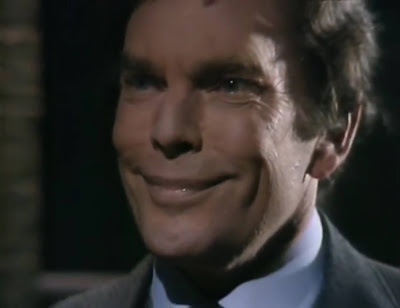 |
| Callan struggles with the aftermath of his brainwashing. |
Air Date: Apr. 8, 1970. Written by: James Mitchell. Directed by: Jim Goddard. Produced by: Reginald Collin.
THE PLOT:
"I reckon Callan is slipping."
It has been five months since Callan was shot after killing Hunter. He has spent that time in the hospital, and has made a fine recovery... physically, that is. But psychologically, Snell (Clifford Rose), The Section's doctor, considers him incapable of returning to work because he is now "unwilling to kill."
This is unacceptable to the new Hunter (William Squire). Meres is on temporary assignment in America, leaving The Section with a dearth of agents who possess both experience and ability. Hunter needs Callan... but only if he can get him back on form.
To that end, he devises a test, putting Lonely in prison for a potential seven-year stretch. If Callan is able to save his old friend and show some of his former spirit in doing so, then he'll be back on the job. If not, he will be proved useless - And The Section has ways to deal with otherwise useless people who know too much...
 |
| Hunter #4 (William Squire), looking particularly evil. |
CHARACTERS:
Callan: By showing a Callan who doesn't behave in an angry or violent fashion, we see just how important those traits are to his identity. For the first part of the episode, he is polite and deferential... and it feels wrong. Edward Woodward does a great job of letting us see flashes of the old Callan peeking through. At first it's just get a harsh look here or there, but his violent nature shows itself more and more often as the episode progresses, until near the end an angry Callan declares, "I'm back."
Hunter: William Squire debuts as the series' fourth Hunter. He makes a strong first impression. He's calculating and manipulative, and utterly cold-blooded. He looks downright reptilian in some shots, particularly when he gives a downright evil grin near the episode's end. The second Hunter deluded himself into thinking he was a chessmaster; the fourth Hunter actually is one.
Cross: With Anthony Valentine unavailable for Series Three, the producers created a replacement character in Patrick Mower's James Cross. While Meres always respected Callan's abilities, Cross shows no respect at all. He seems eager to have Callan put out to pasture to further his own ambitions. Callan doesn't think much of him, either, bluntly stating that he can beat Cross any time.
Lonely: Resentful of Callan, who was nowhere to be found when he needed him. Reacts with shock when Callan actually apologizes to him, as if doing so has broken an unwritten rule of their bizarre friendship. It's worth noting that this is one of only a few episodes in which Callan openly describes him as a friend - and Lonely rejects that and rejects him. It's only at the end, when Callan rages at him and threatens him, that he finally declares, "Welcome back, Mr. Callan," in a tone that reflects equal parts fear and relief.
Henshaw: Gary Watson guest stars as Henshaw, the expensive barrister who ends up representing Lonely. When he was in the army, Callan saved his life, meaning that he owes him. Henshaw suspects Callan of being a criminal himself, a suspicion Lonely feeds and Callan does nothing to correct. He does his job efficiently, but refuses Callan's proffered handshake at the end, simply reminding him that the two are now even.
 |
| Henshaw (Gary Watson) rejects Callan's handshake. |
THOUGHTS:
Where Else Could I Go? kicks off Callan's third season, introducing the audience to a new Hunter, a new rival agent, and a new office for The Section... oh, and now in color! It isn't as gripping a season opener as Red Knight, White Knight was. However, it is an intelligent, well-judged follow-up to Death of a Hunter, using the developments of that episode to transition into the new setup.
James Mitchell's script wisely focuses not on the new characters, but on Callan and Lonely. The central thread is Callan's emotional state. Cross and the new Hunter may be pulling the strings, but our first impressions of them come not through detailed backstory or through a threat to them; instead, they are framed in terms of their effect on Callan's recovery.
The standalone story involving Henshaw and Lonely's parole is far from the series' most memorable, but it serves as a vehicle for examining the relationship between Lonely and Callan. There's a certain structure to their bizarre friendship, and we see that Lonely has just as little use for a weak Callan as Hunter does.
Overall, not the most exciting episode of the series by any means... but perhaps one of the most interesting, certainly with regard to Callan's character.
Overall Rating: 8/10.
Previous Episode: Death of a Hunter
Next Episode: Summoned to Appear
Review Index
To receive new review updates, follow me:
On BlueSky:
On Threads:


No comments:
Post a Comment